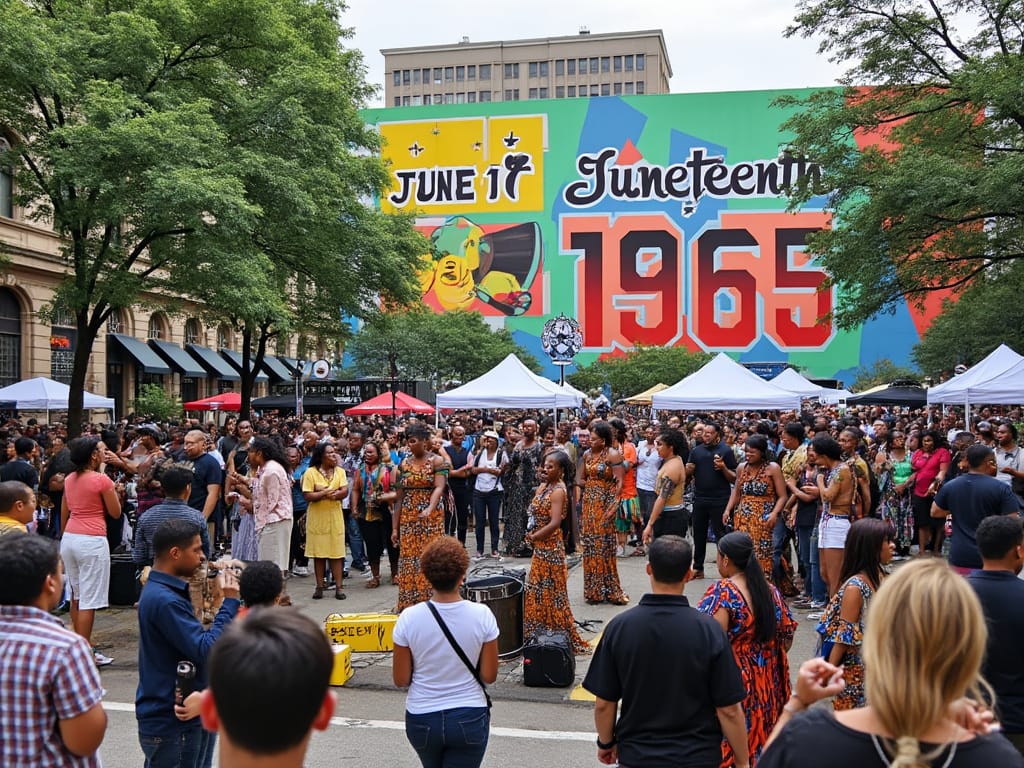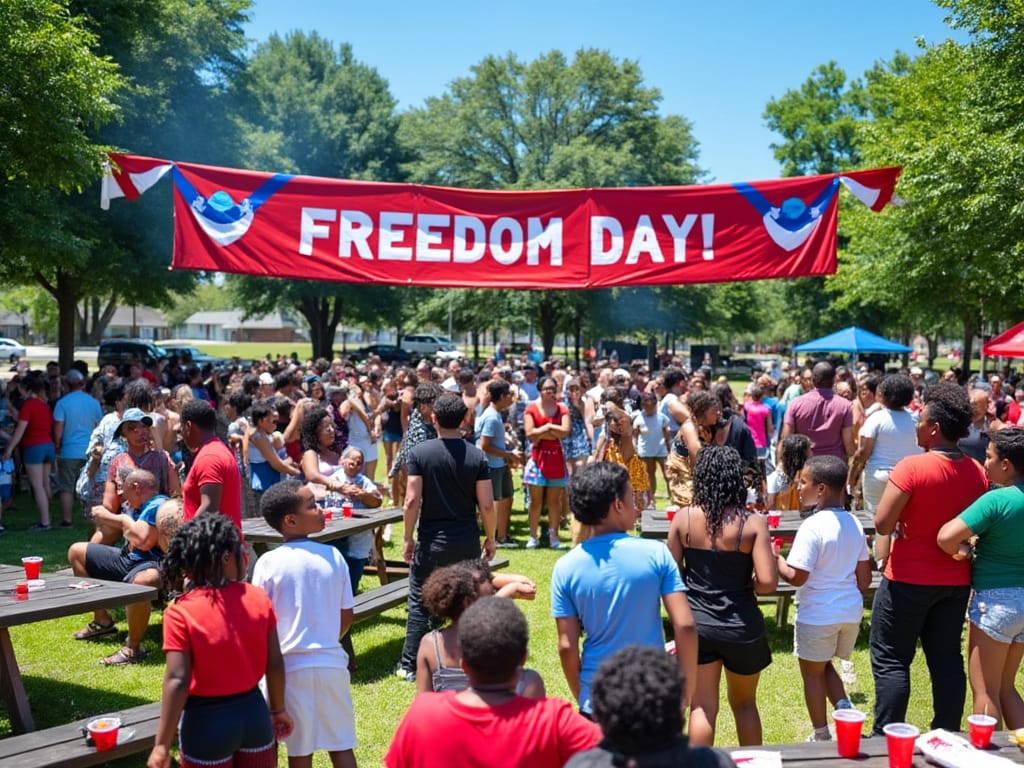- BFA Collective
- Posts
- Celebrate Juneteenth: Embrace Freedom and Racial Justice
Celebrate Juneteenth: Embrace Freedom and Racial Justice
BFA Collective: Explore Juneteenth's significance through traditions and events that celebrate Black culture and inspire engagement in social justice.
Juneteenth celebrations across the United States mark a pivotal moment in American history, a day that embodies the essence of freedom, resilience, and the relentless pursuit of equality. Rooted in the announcement of emancipation to enslaved people in Texas on June 19, 1865—two and a half years after the Emancipation Proclamation—Juneteenth represents not just a day of liberation but a continuing journey toward justice and equality.
The Historical Significance of Juneteenth
The history of Juneteenth begins with General Order No. 3, delivered by Union General Gordon Granger in Galveston, Texas. It declared the freedom of all enslaved people in the state, making Texas the final Confederate stronghold to enforce President Abraham Lincoln’s Emancipation Proclamation. The delayed freedom highlights the complexities of America’s struggle with slavery and the systemic barriers that kept millions oppressed long after they should have been freed.
The moment was monumental yet bittersweet. For many newly freed individuals, Juneteenth marked a new beginning fraught with challenges. Despite the proclamation, the road to equality was anything but immediate. The era of Reconstruction brought new opportunities but also birthed systemic racism, segregation, and violence. This dichotomy underscores why Juneteenth is both a celebration and a call to action.

Join BFA Collective for fresh insights, cultural deep dives, and stories that matter—delivered straight to your inbox. Sign up today and stay inspired!
Juneteenth Traditions: Honoring the Past, Celebrating the Present
Over the years, Juneteenth traditions have evolved, yet their essence remains deeply tied to honoring Black culture and history. Traditional observances include family gatherings, community festivals, and public readings of the Emancipation Proclamation. Barbecues and feasts are central to the celebrations, symbolizing unity and nourishment—both physical and spiritual.
One enduring tradition is the drinking of red beverages, such as hibiscus tea or strawberry soda, symbolizing resilience and the bloodshed of those who fought for freedom. Parades, music festivals, and performances spotlight the contributions of African Americans to art, culture, and society. These events often blend reflection with joyous expression, embodying the duality of Juneteenth as a solemn remembrance and a spirited celebration.
Celebrating Black Culture: Modern Juneteenth Celebrations
Modern Juneteenth celebrations have expanded far beyond local gatherings, becoming nationally recognized events that bring together diverse communities. Cities like Atlanta, Houston, and Los Angeles host large-scale festivals featuring concerts, art exhibitions, and educational seminars. Organizations like the NAACP and Black Lives Matter use Juneteenth as a platform to promote social justice initiatives, making it a day not only to celebrate but also to mobilize.
For instance, the Smithsonian National Museum of African American History and Culture in Washington, D.C., offers Juneteenth programming that includes panel discussions, historical exhibits, and storytelling sessions. Such initiatives aim to educate attendees on the rich tapestry of African American history while inspiring collective action toward equality.
Juneteenth’s federal recognition in 2021—signed into law by President Joe Biden—marked a historic milestone. The designation of Juneteenth as a national holiday underscores its significance as a unifying moment of reflection and celebration. This recognition has spurred greater awareness and participation, with schools, businesses, and local governments embracing the day with renewed vigor.
Stories of Resilience: Influential Figures and Milestones
The journey toward Juneteenth’s widespread recognition is paved with the efforts of countless individuals who championed freedom and equality. Figures like Frederick Douglass, Harriet Tubman, and Sojourner Truth laid the groundwork for emancipation through their relentless advocacy and activism. Douglass’s eloquent speeches and writings challenged the conscience of a nation, while Tubman’s bravery in leading enslaved people to freedom exemplified the spirit of resistance.
The Civil Rights Movement, spearheaded by leaders like Martin Luther King Jr. and Rosa Parks, drew inspiration from the struggles of enslaved people. Landmark achievements such as the Civil Rights Act of 1964 and the Voting Rights Act of 1965 reflect the enduring fight for justice—a struggle that continues today.
More recently, activists like Opal Lee, affectionately known as the “Grandmother of Juneteenth,” played a pivotal role in elevating the holiday’s profile. Lee’s campaign to make Juneteenth a national holiday, which included a 2.5-mile walk symbolizing the two and a half years it took for emancipation to reach Texas, exemplifies the power of grassroots activism.
Freedom Celebrations: A Call to Action
Juneteenth celebrations are not just about looking back; they are a call to address the challenges that persist. Systemic inequalities in education, employment, and criminal justice highlight the unfinished work of achieving true equality. Events like voter registration drives and community service projects often accompany Juneteenth festivities, reinforcing the holiday’s role as a catalyst for change.
Educators and parents are increasingly using Juneteenth as an opportunity to teach younger generations about the importance of freedom, justice, and civic engagement. Schools and community centers host workshops, book readings, and art projects that explore themes of resilience and cultural pride. These efforts ensure that the legacy of Juneteenth is not just remembered but actively upheld.

Reflecting on Progress and Challenges
While Juneteenth celebrates a significant milestone in the fight for freedom, it also serves as a reminder of the long road ahead. The holiday invites reflection on America’s progress and the systemic barriers that remain. The Black Lives Matter protests of recent years, sparked by incidents of police brutality, have brought renewed attention to the need for systemic reform. These movements echo the struggles of those who fought for freedom in the 19th century, demonstrating the enduring relevance of Juneteenth’s message.
The growing recognition of Juneteenth also raises questions about its commercialization. As the holiday gains mainstream attention, it is crucial to ensure that its significance is not diluted. Authenticity must remain at the heart of Juneteenth celebrations, prioritizing education, cultural expression, and community empowerment over mere profit-driven festivities.
How to Celebrate Juneteenth
For those looking to honor Juneteenth, there are countless ways to engage meaningfully. Attend a local Juneteenth festival or parade, where you can enjoy live music, food, and cultural performances while supporting Black-owned businesses. Take time to learn about African American history by visiting museums, reading books, or watching documentaries that explore the struggles and triumphs of the Black community.
Participate in community service projects or donate to organizations that fight for racial justice. Reflect on the legacy of Juneteenth by having meaningful conversations about equality and inclusion with friends and family. Whether through education, celebration, or activism, each act contributes to the ongoing journey toward justice.
Conclusion: Honoring Juneteenth’s Legacy
Juneteenth is more than a holiday; it is a testament to the resilience, creativity, and strength of the Black community. It is a day to celebrate freedom while acknowledging the complexities of the fight for equality. As Juneteenth celebrations continue to grow in scale and significance, they serve as a powerful reminder of what has been achieved and what remains to be done.
By engaging in meaningful traditions, supporting social justice initiatives, and fostering education, we can honor Juneteenth’s legacy and ensure its relevance for generations to come. In doing so, we not only celebrate the freedom of those who came before us but also recommit ourselves to the pursuit of a more just and equitable society.
Reply